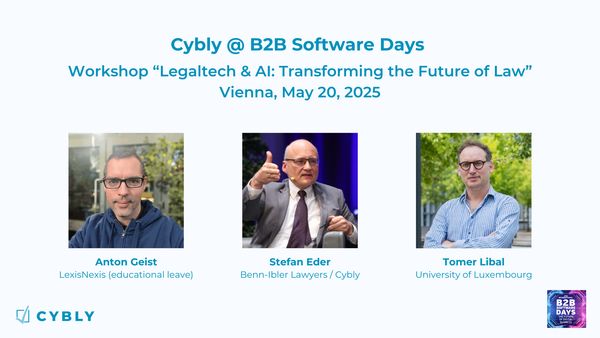AI in Legal Practice

At the 8th International B2B Software Days 2025, Cybly GmbH hosted a forward-looking workshop titled “LegalTech & AI”. On May 20, three leading experts discussed the potential of AI application in legal practice—practical, critical, and future-oriented.
How Does the Use of AI Transform Legal Work?
The workshop focused on how AI can transform legal processes, decision-making, and information processing. Both practical applications and legal, ethical, and technical challenges were examined.
Get to know Cybly solutions now
Speakers & Their Insights on the Use of AI in Legal Practice
Stefan Eder – Shareholder at Cybly GmbH & Partner at Benn-Ibler Rechtsanwälte
Thema: Legal Automation with AI
The experienced lawyer and business informatics graduate demonstrated how AI structurally supports everyday legal work, e.g., through automated, intelligent workflows in company formation.
Tomer Libal – Researcher at the University of Luxembourg
Thema: AI Accuracy and Transparency.Yes, It’s Possible!
Tomer Libal’s presentation addressed the challenges and solutions related to accuracy and transparency in AI systems. He showed that hybrid approaches combining machine learning and machine reasoning, supplemented by methods like chain-of-thought, verification chains, and retrieval-augmented generation, can help develop trustworthy and explainable AI solutions.
Anton Geist – AI & Law Expert at LexisNexis (currently on educational leave)
Thema: Use of AI in the Austrian legal sector
“My brief overview examines the growing use of artificial intelligence (AI) in the Austrian legal sector, covering the current state, practical applications, benefits, challenges, and future prospects. Since 2023, there has been rapid development of AI in the legal field in Austria, with 36% of law firms now using AI tools. Practical applications include contract analysis, legal research, automation of routine tasks, and virtual legal advice. Companies benefit from increased efficiency, cost savings, and higher accuracy. However, challenges such as data protection, AI hallucinations, bias, regulatory requirements (EU AI Act), and the need for human judgment remain. Ethical responsibility is emphasized. The future envisions further expansion of AI in law, including more powerful models, predictive analytics, and hybrid teams of humans and AI.” - Anton Geist
Use of AI in Legal Practice: Download Presentations & Further Information
All presentations and supplementary materials are now available for download:
- Legal Automation with AI – Stefan Eder
- AI Accuracy and Transparency.Yes, It’s Possible! – Tomer Libal
Further information on our products related to legal workflow automation, contract analysis, and AI in legal practice can be found here.
Conclusion: The Potential of AI in Legal Practice is Enormous - when Technology and Legal Practicioners Go Hand in Hand
The workshop highlighted that artificial intelligence offers enormous potential to make processes in legal practice more efficient and support well-founded decisions. To fully exploit this potential, high-quality and reliable data foundations are essential. Despite all progress, AI cannot replace human intuition and experience—it serves as a complementary tool that strengthens but does not displace human decision-making.
All Posts